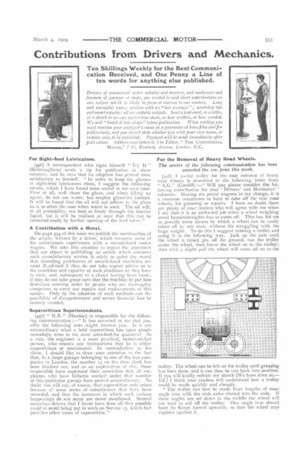Contributions from Drivers and Mechanics.
Page 21

If you've noticed an error in this article please click here to report it so we can fix it.
Ten Shillings Weekly for the Best Communication Received, and One Penny a Line of ten words for anything else published.
Drivers of commercial motor vehicles and tractors, and mechanics and foremen of garazes or shops, are invited to send short contributions on any subject wird' is likely to prove 01 interest to our readers. Long and successful runs ; services with na "lost journeys" ; workshop tips and smart repairs : all are suitable subjects. Send a Post.eard., or a letter, or a sketch to us—no mallet. how short, or how written, or how worded.
We will "knock it into shape" before publication. When writing you must mention your employer's name as a guarantee of bona files (not for publication), and you should state whether you wish your own name, or initials only, to be published. Payment will he made immediately after publcation. Address your letters to 1 he Editor," THE COMMERCIAL
Morose," 7 15, Rosebery Avenue, London, E.C.
For Sight-feed Lubricators.
[496] A correspondent who signs himself " Try It " (Belbroughton) sends a tip for publication in these columns, and he says that its adoption has proved most satisfactory to himself. " In order to keep the glasses of sight-feed lubricators clean, I suggest the following means, which I have found most useful in nip own case. First of all, well clean the glass, and when filling up again, do not use water, but employ glycerine instead, It will be found that the oil wili not adhere to the glass as is so often the case when water is used. The oil will, in all probability, not feed so freely through the heavier liquid, but it will be realised at once that this can be remedied easily by further opening of the feed valve."
A Contribution with a Moral.
On page 554. of this issue we publish the continuation of the article, written by a driver, which recounts some of his unfortunate experiences with a second-hand motor wagon. We take this occasion to repeat the statement that our object in publishing an article which concerns such unsatisfactory service is solely to point the moral that intending purchasers of second-hand machin.cs are most ill-advised if they do not take expert advice as to the condition and capacity of such machines as they have in view, and, subsequent to a choice having he-en made, if they do not take great care that the machine be put into first-class running order by people who are ihoroughiy competent to carry out repairs and replacements of this nature. Only by the adoption of such methods can the possibility of disappointment and severe financial loss be CI1 arch, avoided.
Superstitious Superintendents.
[4971 " MR." (Hendon) is responsible for the follow ing communication It has occurred to me that possibly the following note might interest you. Is it not extraordinary what a hold superstition has upon people nowadays, even in the most unlooked-for quarters? As a rule, the engineer is a most practical, matter-of-fact person, who resentsany insinuations that he is either superstitious or sentimental. In contradiction to his claim, I should like to draw your attention to the fact that, in a large garage belonging to one of the bus companies in London, the number 13 on the time clock has been blanked out, and as an explanation of this, those responsible have expressed their conviction that all employees who have hitherto worked under that number at this particular garage have proved unsatisfactory. No doubt You will say ,.of course, that superstition only arises because of some series of coincidences that have been recorded, and that the instances in which such curious happenings do not occur are never mentioned. Several motorbus drivers that I know have done all they possibly could to avoid being put to work on Service 13, which fact provides other cases of superstition." For the Removal of Heavy Road Wheels.
The sender of the following communication has been awarded the los. prize this week.
[4981 A useful trolley for the easy removal of heavy road wheels is described in the following letter from " A.G." (Cardiff) :—" Will you please consider the following contribution for your Drivers' and Mechanics" columns. Having six petrol wagons in my charge, it is a common occurrence to have to take off the rear road wheels, for greasing or repairs. I have no doubt there are plenty of your readers who will agree with me when
I say that it is an awkward job when a wheel weighing seven hundredweights has to come off. This has led me to provide some means by which a wheel can he easily taken off by one man, without his struggling with the huge weight. To do this I suggest making a trolley and using it in the following way. Jack up the axle until the wheel is raised 3in off the ground, run the trolley under the wheel, then lower the wheel on to the trolley; then with a slight pull the wheel will come off on to the trolley. The wheel can be left on the trolley until greasing has been done, and it can then be run back into position_
II you will kindly redraw my sketch [We have done so.— Ed.1 I think your readers will understand how a trolley could be made quickly and cheaply. " The trolley can best be made from lengths of stout angle iron with the stub axles riveted into the ends. If these angles are set down in the middle the wheel will not tend to roll off the trolley. One angle iron should. have its flange turned upwards, so that the wheel may register against it,
























